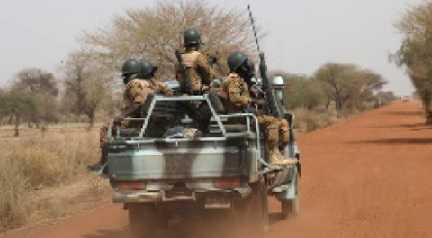
OUAGADOUGOU, Burkina Faso (AP) — Ami Sana hangs a tattered tarp for a bit of shade where she can rest on a break from pounding stones under the scorching sun.
“The work is hard. It makes my body weak, but what else can I do?” she asked.
The mother of six is one of 2 million people displaced by Burkina Faso’s rapidly rising Islamic extremist violence, according to the U.N.
Amid the clamor of clanging pickaxes and falling rocks, Sana has found work in the Pissy granite mine on the outskirts of Burkina Faso’s capital, Ouagadougou.
Lifting heavy rocks and hammering them into gravel to sell to construction companies is tough work that doesn’t earn her enough to adequately feed or educate her children, Sana said. But it’s the best work that she could find.
The rush of civilians from rural villages plagued by extremist violence has put pressure on Burkina Faso’s cities.
“Some of the host cities have doubled or tripled in size in the past three years, and their infrastructures are often stretched to a breaking point,” said Hassane Hamadou, country director for the Norwegian Refugee Council.
“Schools can’t absorb all the new children, water points can’t provide enough for all. Hundreds of thousands are left without access to an education, clean water or healthcare as a result,” he said.
The influx of displaced people is causing competition among the approximately 3,000 people working at the granite mine. At least 500 displaced people started working at the mine last year making it harder for the original miners to earn a living, said Abiba Tiemtore, head of the site.
“With more people, it’s hard to collect as many rocks and it’s impacting our daily income,” she said. Miners who used to make approximately $1 a day say they are now lucky if they make 80 cents.
When it seized power in January, Burkina Faso’s ruling junta vowed to stamp out extremist violence but it has done little about the swelling numbers of displaced.
The government has a responsibility to provide the swelling numbers of displaced with those social services, said Alexandra Lamarche, senior advocate for West and Central Africa for Refugees International.
The minister of humanitarian affairs did not respond to a request for comment on the situation.
So far the junta has not succeeded in stemming the extremist violence. In January, 160,000 people were newly displaced, the second-largest monthly increase in three years, according to a report by international aid groups. Hard-hit areas like the Center North region, which hosts Burkina Faso’s largest displaced population, are buckling under the pressure.
“The impact of people moving from their farms into big cities is disorientation (and) the increase of poverty (and) fear,” said Abdoulaye Pafadnam, former mayor of Barsalogho, one of the main towns in the Center North region.
The violence is cutting off access for aid groups to reach people in need. Roads that were safe to travel six months ago are lined with explosives and the United Nations had only one helicopter until recently to transport people and aid across the country.
The pressure on cities has also started creating rifts between some host and displaced communities. In the northern town of Ouahigouya, people sheltering in a crowded displacement camp said locals chase them from the forest if they try to chop wood for cooking, accusing them of trying to destroy it.
With no end to the jihadi violence in sight, the numbers of Burkina Faso’s displaced are expected to continue flooding urban centers where they’ll be hunting for jobs.
“I worry that I have no means to take care of my children,” said Fati Ouedraogo, a displaced mother of 10 in Ouahigouya. “When the children are crying I don’t know what to do.”




